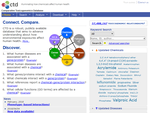
Comparative Toxicogenomics Database: CTD
| North Carolina State University | |
| United States | |
| The Comparative Toxicogenomics Database (CTD) advances understanding of the effects of environmental chemicals on human health. Biocurators manually curate chemical-gene, chemical-disease, and gene-disease relationships from the scientific literature. This core data is then internally integrated to generate inferred chemical-gene-disease networks. Additionally, the core data is integrated with external data sets (such as Gene Ontology and pathway annotations) to predict many novel associations between different data types. A unique and powerful feature of CTD is the inferred relationships generated by data integration that helps turn knowledge into discoveries by identifying novel connections between chemicals, genes, diseases, pathways, and GO annotations that might not otherwise be apparent using other biological resources. | |
| , , , , , , , , , | |
| Health/Disease, Chemical compound | |
| Environment, Bibliography/Documents, Phenotype, Interaction/Pathway | |
| - | |
| English | |
| Active | |
| - | |
| - | |
| - | |
| - | |
| - | |
| - |
| - | |
| - | |
| - | |
| https://fairsharing.org/10.25504/FAIRsharing.h3tjtr | |
|
Search Tool for Interactions of Chemicals ChemProt JECDB Chemical hazard assessment document HumanNet enviPath IRIS J-CHECK |
| See the corresponding part in the FAIRsharing record. | |
 (2018-12-21) (2018-12-21)
|
|
| 2019-03-28 | |
| 2020-07-09 | |
| Creative Commons Attribution and Share-alike (CC-BY-SA) International 4.0 license |
